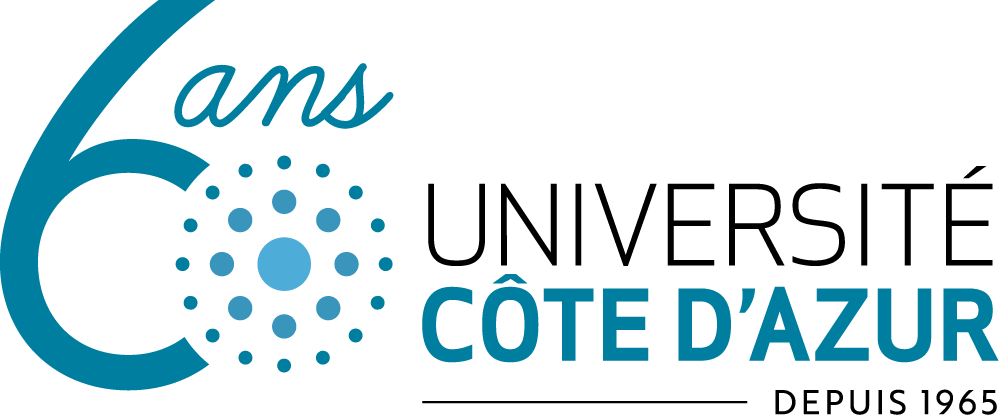ERASMUS+ Track - Biomedical and Computational Sciences in Ageing (imAGEin)
- Science and Technology
Résumé
An international programme designed to educate the next generation of leading researchers, translational scientists, entrepreneurs, and professionals in the biology of ageing. Read moreObjectifs
Details
Accéder aux sections de la fiche
Introduction
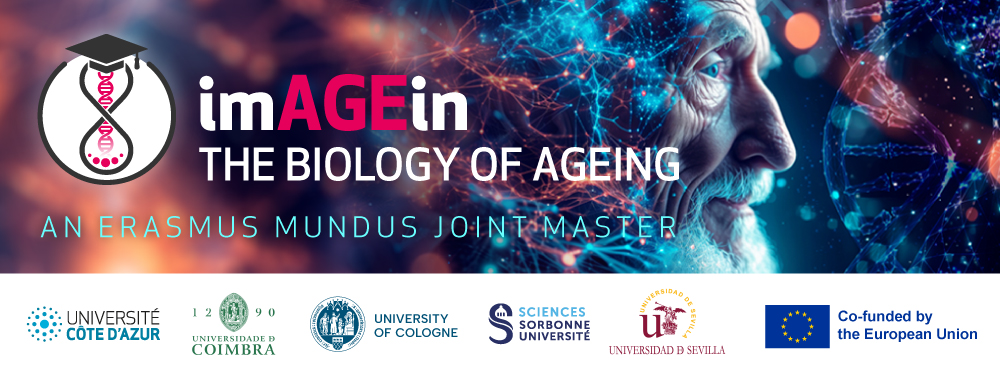
imAGEin programme is designed to achieve the ambitious vision of an innovative, inclusive and globally competitive and attractive two-years joint Master programme to generate added value to knowledge and research, by delivering innovation with societal impact, and therefore contribute to tackle the health negative consequences associated to the European demographic change towards an increasing share of aged population.
- The first-year compulsory pedagogic offer was defined as a broad knowledge base on the Biology of Ageing, while offering specific local expertise.
- The second year reflects even more the specialization strengths of each imAGEin partner with important investment into fundamental or applied research projects through the Master Thesis internship.
This programme is the result of a collaboration between 5 prestigious universities, and provides a real passport for professional pursuits abroad:
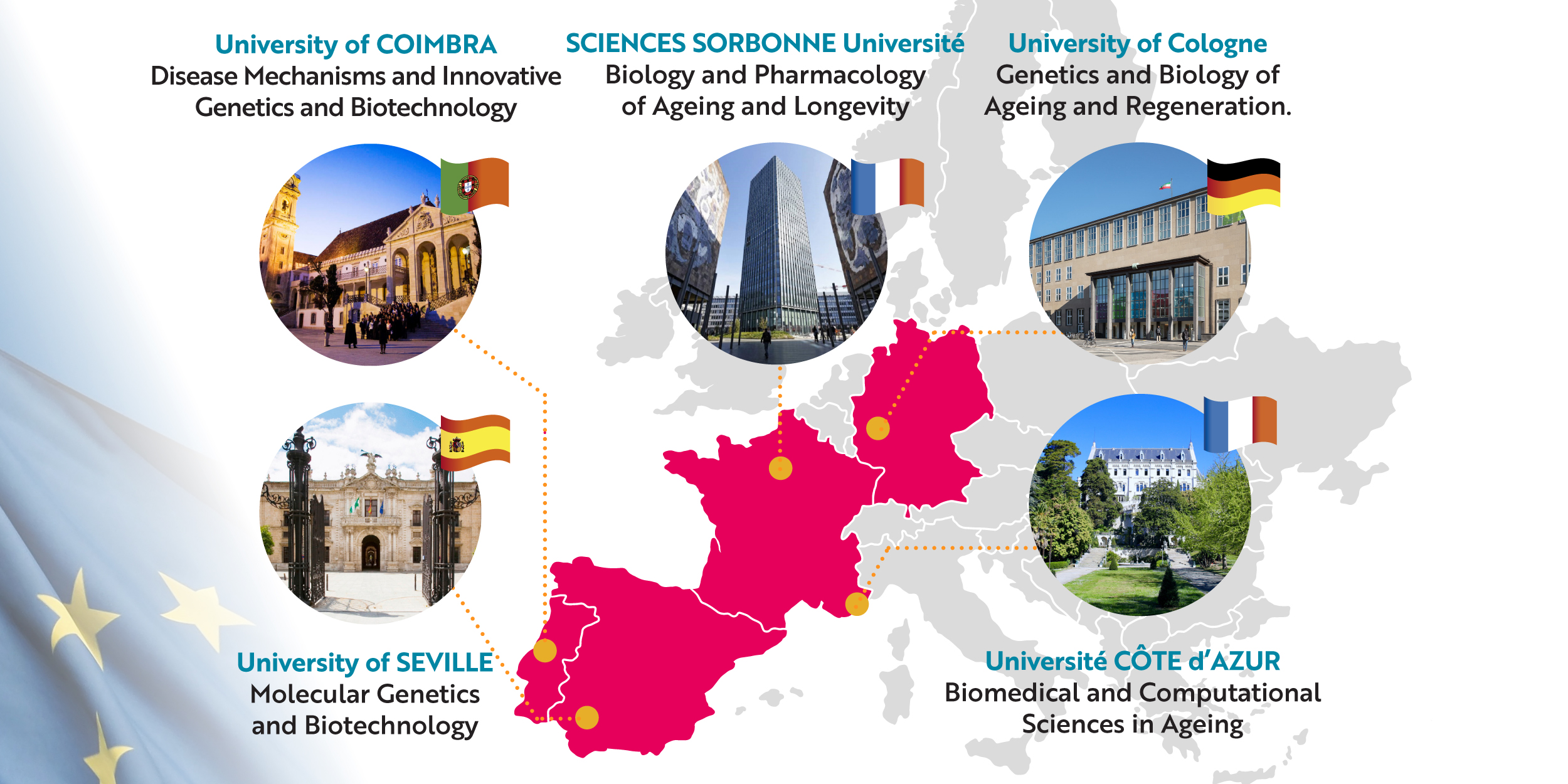
- Université Côte d'Azur (France)
- University of Cologne (Germany)
- University of Coimbra (Portugal)
- Université de Paris Sorbonne Sciences (France)
- University of Seville
- European university Ulysseus
General Structure
imAGEin contemplates Joint activities, in order to develop a common backbone through joint education. The aim is to enrich the imAGEin Joint Programme with state-of-the-art research within all Partners, outreach activities and translational knowledge.
Joint activities will also promote team building, notably by trust and understanding between imAGEin students and partners' staff. The Consortium defined two types of joint meetings: regular synchronous online classes (Evening SynClass) and punctual presential weeks (imAGEin joint-Weeks).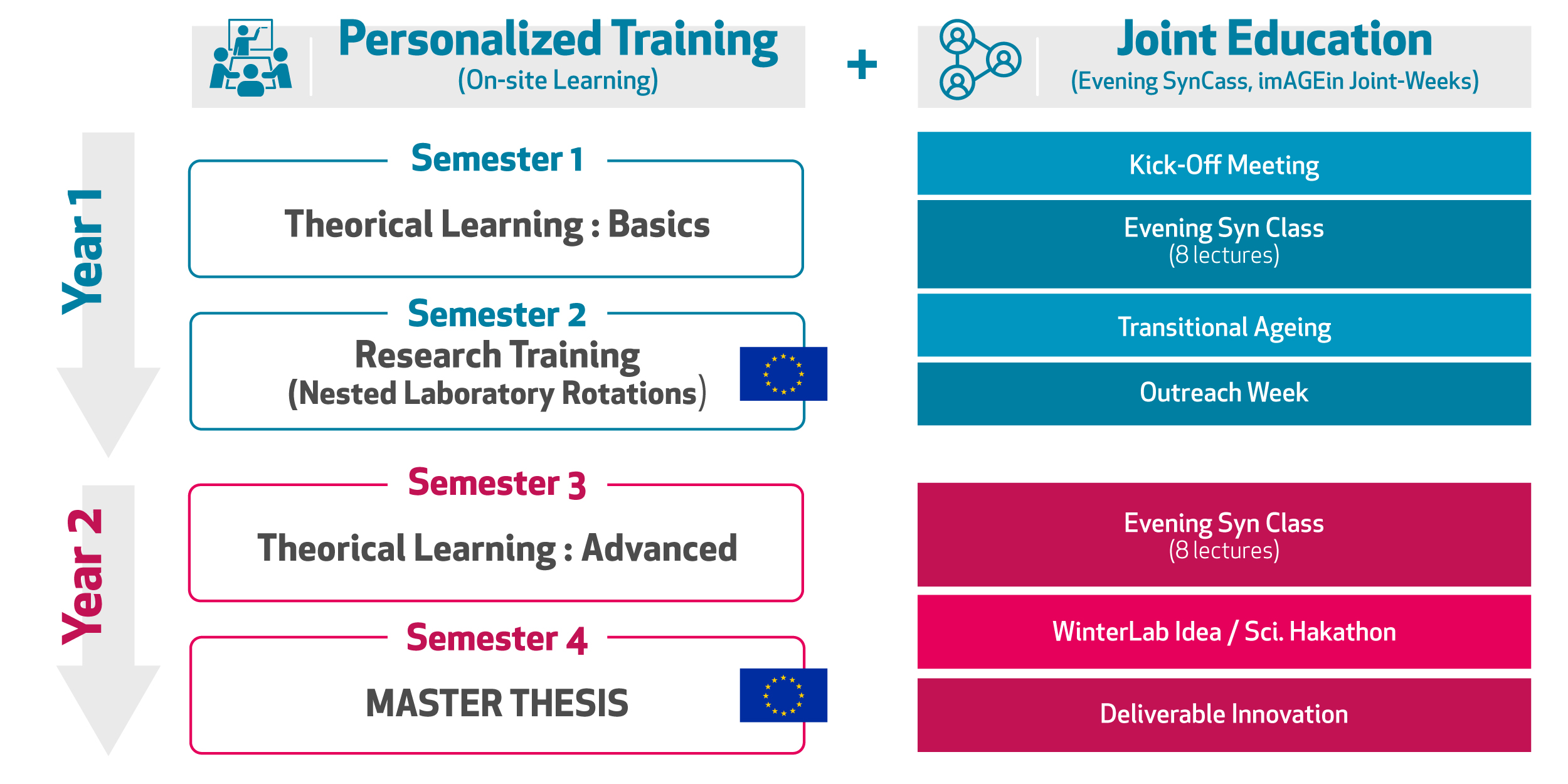
Objectives
Why understanding the Biology of Ageing is a global challenge?
Long-term projections suggest that if population ageing is not addressed, public sector finances will face growing strain over the next 50 years due to rising age-related expenditures.As a result, demographic and economic trends position the biology of ageing as a major challenge for modern scientific research.
Advancing this field will be essential for developing innovative, sustainable solutions to improve healthspan while alleviating the economic burden of ageing populations worldwide.
Specificities
An innovative two-years joint Master programme
imAGEin programme is designed to achieve the ambitious vision of an innovative, inclusive and globally competitive and attractive two-years joint Master programme to generate added value to knowledge and research, by delivering innovation with societal impact, and therefore contribute to tackle the health negative consequences associated to the European demographic change towards an increasing share of aged population.
- The first-year compulsory pedagogic offer was defined as a broad knowledge base on the Biology of Ageing, while offering specific local expertise.
- The second year reflects even more the specialization strengths of each imAGEin partner with important investment into fundamental or applied research projects through the Master Thesis internship.
Details on each year semester curriculum and modules mutualized in imAGEin at each partner are provided on the Syllabus page.
All imAGEin curricula include one compulsory physical mobility between two countries, different from the student’s country of residence, where at least one semester corresponding to 30 ECTS needs to be validated. imAGEin mobility program will therefore be structured into two blocks of one year each.
Places
- Nice, France
- Cologne, Germany
- Paris, France
- Seville, Spain
- Coimbra, Portugal
Person in charge of the academic program
- Alexandre OTTAVIANI (Université Côte d'Azur)
- Paula POUSINHA (Université Côte d'Azur)
- Yareli ESQUER-GARRIGOS (Université Côte d'Azur)
- Björn SCHUMACHER (University of Cologne)
- Fabin KROHM (University of Cologne)
- Bertrand FIGUET (Sciences Sorbonnes Université)
- João PECA (University of Coimbra)
- David POZO (University of Seville)
- Rocio MARTINEZ DE PABLOS (Director of Ulysseus European University)
Partnership
Institutions

Université Côte d'Azur (France)
Université Côte d'Azur has the status of a Grand Établissement. It is a recipient of the prestigious national "IdEx" label for initiatives of excellence, positioning it among the nine French "IdEx" universities that are research-intensive and have strong international influence. Organized into innovative internal components with increased responsibilities for greater agility, the University Côte d'Azur anchors all its educational and innovation missions in the excellence of its research.
As a founding member of the European alliance Ulysseus, the host of one of France's four Interdisciplinary Institutes for Artificial Intelligence (3IA), and with major partnerships with leading national research organizations, the University Côte d'Azur aims to rank among the best European universities and further solidify its international presence.
The University includes CNRS/INSERM research institutes as the Institute for Research and Cancer and Ageing (IRCAN), the Institute of Molecular and Cellular Pharmacology (IPMC), the Institute of Biology Valrose (iBV), the Mediterranean Center for Molecular Medicine (C3M) and the Laboratoire de PhysioMédecine Moléculaire (LP2M).

University of Cologne and CECAD (Germany)
University of Cologne is one of the largest Universities in Germany, UoC has developed the theme of aging-associated diseases as one of its key profile areas. The cluster of Excellence: Cellular Stress Responses in Aging-associated Diseases (CECAD) is a worldwide leading epicenter of aging research. CECAD has built a unique focus on organismal studies on aging that use cutting edge technology to investigate the mechanisms of aging in the physiological context. Based on the strong synergies between the biologists and clinician scientists within CECAD, the students will receive comprehensive education on the mechanisms of age-related diseases and how organismal studies can identify causes and mechanisms of human diseases and develop the therapies of the future.
 Sciences Sorbonne Université (France)
Sciences Sorbonne Université (France)Sciences Sorbonne Université is a world-class research university, presenting a comprehensive range of disciplines from arts, humanities, social sciences to biological sciences, engineering and medicine. Training in the Aging and Longevity track is based on the recognized expertise of researchers from SU, CNRS/INSERM academic teams, private organizations (pharmaceutical and cosmetics industry, biotech) and hospitals. There is a privileged partnership with the teams of the Paris-Seine Institute of Biology, particularly within its Development, Adaptation and Aging (Dev2A) department located on the main Pierre and Marie Curie Campus and in which studies are focused on stress responses, adaptation, resilience and repair, as well as with other teams from the Cordeliers Research Center, the Vision Institute, the Brain and Spinal Cord Institute, the Myology Institute and Sorbonne University hospitals (Pitié-Salpêtrière, Charles-Foix and Saint-Antoine).

University of Seville (Spain)
University of Seville is a founder and the coordinator of Ulysseus European University. All the assigned teaching staff from USE carry out an outstanding research and technology transfer activity in molecular mechanisms linked to ageing and neurodegeneration at two research centers, namely CABIMER (Center for Molecular Biology and Regenerative Medicine) and IBIS (Institute of Biomedicine of Seville). CABIMER is dedicated to DNA damage, one of the leading causes of ageing, and regenerative medicine, one of the most promising field for anti-ageing interventions. The USE assigned teaching staff working at CABIMER/IBIS in different aspects related to ageing have close ties to the Hospital Universitario Virgen del Rocío (HUVR) University of Seville Hospital.

University of Coimbra (Portugal)
University of Coimbra has a strong focus on aging research, with two institutes, the Center for Innovative Biomedicine and Biotechnology (CIBB) and the Multidisciplinary Institute of Ageing (MIA), conducting intense research programmes in this area. CIBB is home to the largest group of biomedical and biotechnology investigators in the region of Portugal and hosts 600 members, including 298 integrated PhD holders and clinicians from the Coimbra University Hospital and healthcare system, as well as key collaborators from the biotech and pharmaceutical industries. MIA, a partnership between UC, the University of Newcastle, the University Medical Center Groningen, Copenhagen University and Mayo Clinic, focuses on bridging the gap between top-level research in aging and its application in clinical and geriatric care.
ImAGEin students who select the University of Coimbra will have the opportunity of externalization to the partners from the Multidisciplinary Institute of Ageing, namely the University Medical Center Groningen (UMCG) hosting the European Institute for the Biology of Ageing (ERIBA). CIBB researchers at UC also coordinate a regional consortium - Ageing@Coimbra - which has been recognized by the European Commission as a Reference Site of the European Innovation Partnership on Active and Healthy Aging (EIP on AHA). This consortium aims to transfer innovative knowledge on aging research and provide support for healthy living and innovative solutions to the market. UC has a strong track record of success in competitive EIT Health, H2020, and Horizon projects focusing on ageing, including the Teaming for the Multidisciplinary Institute of Ageing (MIA-Portugal), the ERA Chair on Aging, the Collaborative Laboratory of Aging (CoLab4Ageing), the Excellence Hub project on Aging (Changing), and is the coordinator of the international EIT Health Aging PhD School.
Admission
Prerequisite
Prerequisites for enrolment
Prerequisites training
English Language Proficiency Requirements
Knowledge of the English language is considered as a basic requirement. All students must provide evidence of their proficiency in English through at least one of the following documents:
- A recent TOEFL Certificate: minimum score of 580 points (paper), 237 (computer, each component >22) or 93 points (internet)
- A recent IELTS Certificate: minimum score of 6.5
- A recently obtained CEFR level of English B2
- A recent Certificate of a University Language Centre testifying that the student masters the necessary knowledge of English to function academically
- A recent Cambridge C2 Proficiency (CPE) or C1 Advanced (CAE) 180, Cambridge component score 176
- A certificate proving that you have followed at least 1 year of higher education in English
Oral English proficiency will also be taken into account during interviews of applicants in phase 2 of the selection process.
Educational Background
All candidates should possess a Bachelor’s degree (180 ECTS) or equivalent Diploma in STEM (Science, Technology, Engineering, and Mathematics).A Candidate who is currently enrolled in the last year of Bachelor at the time of application is allowed to apply, but final admission will only be effective if proof of graduation is provided before IMAgein programme start, i.e. in July of the application year for the latest.
Target audience
- Students from any country
- Students who possess a Bachelor’s degree (180 ECTS) or equivalent Diploma in STEM (Science, Technology, Engineering, and Mathematics).
- Any student wishing to syudy abroad
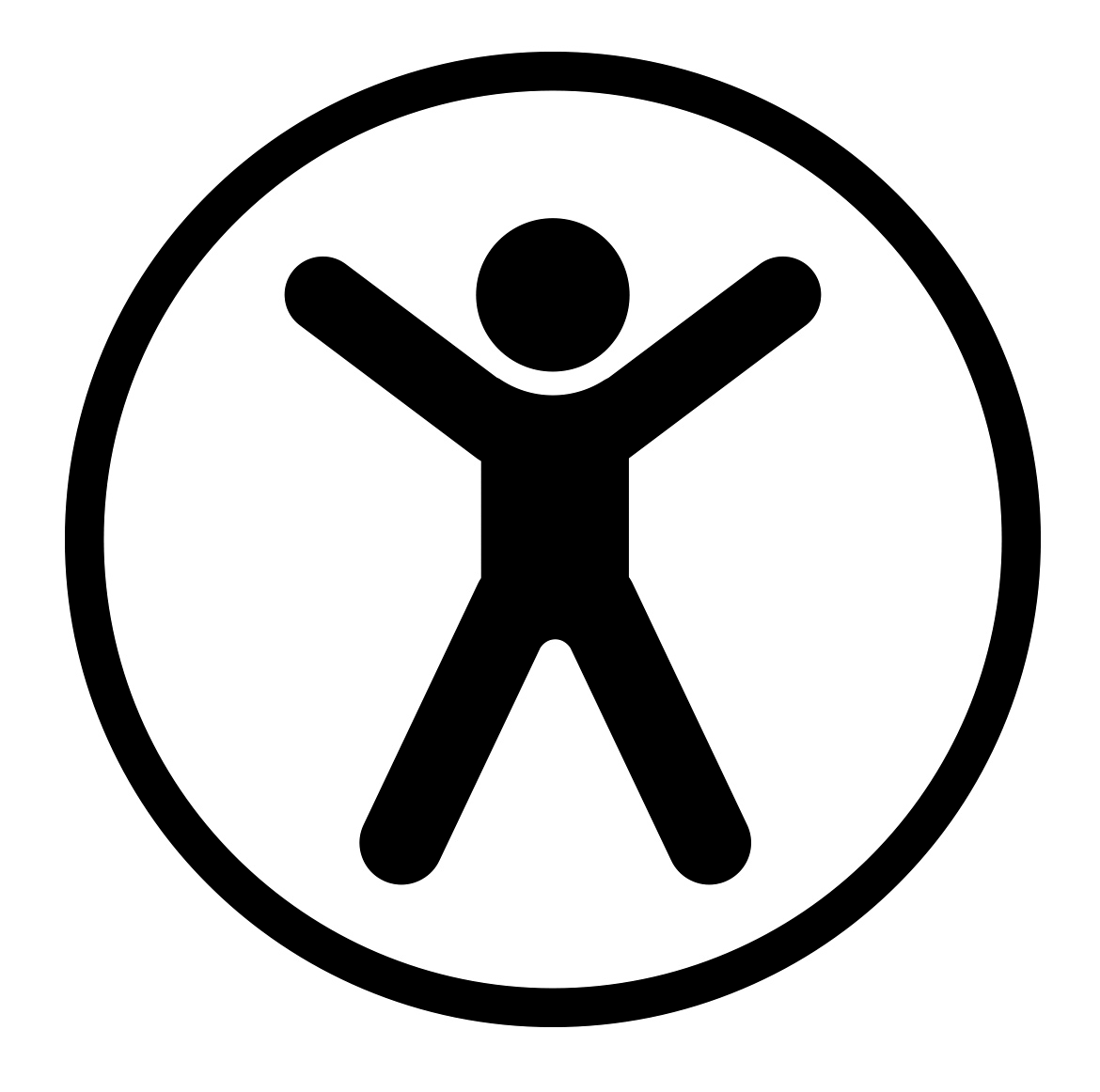
Visit the "Mission Handicap" website
Application
Conditions of applications
This will happen in two phases:
Phase 1 :
A careful selection of the participants will be performed based on the documentation submitted.
Partners jointly agreed how points will be given by the ISC to each application, on a scale from 0 to 10, making use of the following selection criteria:
- (a) Academic scores
- (b) Language skills (eligible or not eligible)
- (c) reference letters
- (d) Overall quality of the Curriculum Vitae and/or other experiences
- (e) Relevance of the proposed Personalized Training Plan
- (f) Motivation letter
Only if the total score obtained is higher or equal to 6,5 (2/3 of the maximum), the candidate is considered eligible for admission. Any ranking lower than 6,5/10 will not be considered for further evaluation. The ranking obtained in the selection procedure will be strictly respected throughout the admission decision process and the awarding of grants.
Phase 2 :
A shortlist of the best score-ranked applicants will be interviewed by at least 2 to 3 randomly selected members of the ISC who will give them a second score on a scale from 0 to 10. The ISC will then establish the final ranked list of candidates based on the addition of Phase 1 and Phase 2 scores (total score on a 6,5 to 20 scale). Documents à fournir :
Le formulaire de candidature doit être rempli en anglais et les documents suivants, traduits en anglais, doivent être téléversés :- A copy of applicant’s ID card or passport
- A Bachelor degree in STEM (Science, Technology, Engineering, and Mathematics), nationally accredited, with an overall average indicating mastery of a core foundation of disciplinary knowledge and associated experimental methods, in line with pursuing studies in a selective Master's program with a minimum of 180 obtained ECTS.
- Legal copies of diplomas and an official translation in English must be provided. If the diploma is not yet obtained at the time of application (e.g. student is in their last year of Bachelor study), an original proof of enrolment and a most recent transcript of records must be provided. Students who did not obtain their Bachelor degree before the official academic start of the IMAgein joint programme will be excluded from the start of the IMAgein joint programme.
- All academic transcripts should be provided and include a calculation of the 4.0 standard Grade Point Average (GPA) according to the grading scale used by the institution issuing the transcript.
- Copies of diploma supplements stating previously followed courses and scores obtained per course and a translation in English.
- A 2 pages Curriculum Vitae with details on age, academic records and quality/recognition of the institution having awarded the bachelor or equivalent degree;
- English proficiency documents (see Requirements (link))
- Proofs of professional experiences, awards of honour or other relevant recognitions in the field of life sciences
- A Motivation letter (500 words max).
- A Personalized Training Plan (downloaded from eCandidat) explaining the applicant’s educational, professional & mobility goals during the IMAgein joint programme
- 2 recommendation letters in English
(a) The application process will be entirely online.
(b) No application will be accepted in any other form.
(c) Non-submitted applications, incomplete applications and applications received after the application deadline will not be taken into consideration.
(d) All completed applications will be recorded and archived to ensure full transparency of the selection process.
(e) The programme adheres to principles of equality and non-discrimination. No applicant is discriminated against based on gender, ethnicity, nationality, disability, or any other characteristic.
Conditions of specific applications
Program
Content of the academic programm
Choose your own path
The multiple possible tracks in imAGEin ensure that students will gather original skill sets and build professional profiles that belong to three main paths:
- Fundamental Research
- Applied Biomedical Research
- Innovation and Biotechnology
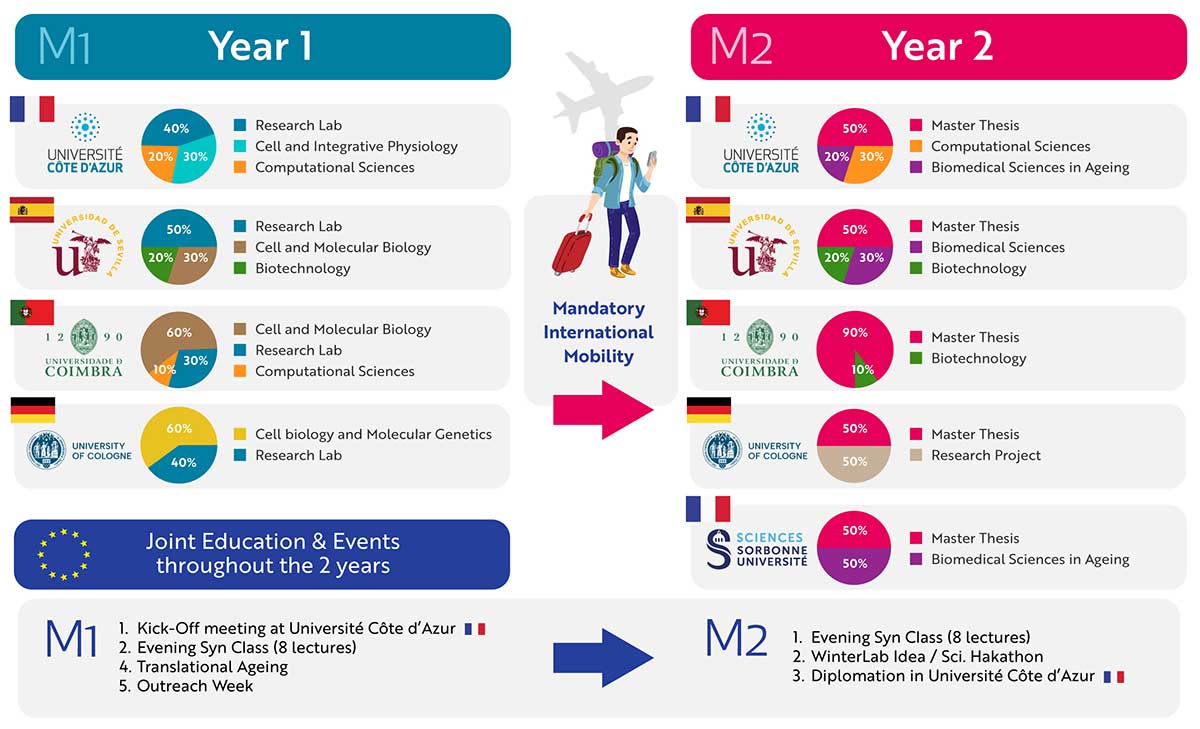
- Mandatory International Mobility between Year 1 and 2 will be defined in the beginning of the 2nd semester (S2).
- Please note that all imAGEin curricula must include one compulsory physical mobility between two countries, different from the student’s country of residence, where at least one semester corresponding to 30 ECTS needs to be validated.
- Joint Education activities are mandatory
Periods spent abroad
Assessment
Transfer of credits and transcripts of records
The IMAgein joint curriculum is based on the ECTS credits systemThe students are bound to the examination regulations and criteria of the imAGEin Partner University where they attend the teaching modules.Examination and evaluation
At the end of each academic year the imAGEin Board will review the study performance status of each student and advises on continuation of the programme in accordance with the regulations at each university. Students should have validated 60 ECTS in the first year to be accepted in the second yearWhen a student has obtained all necessary credits and successfully defended the Master Thesis, the official diplomas and diploma supplement corresponding to the achieved curriculum are issued by the imAGEin Partner Universities in which the student has been registered and Consortium Coordination, respectively.Master Thesis and Deliverable Innovation Report
The Master Thesis can be carried out at any full or associate partner institution or any other previously agreed upon welcoming structure, providing an academic validation has been issued by the imAGEin Board. Additionally, during the S4 each student needs to do a short report (10 pages maximum) in which the student translates the Master Thesis Project into a Deliverable Innovation with societal impact.
Resit
In the case of failure on one exam, a provisional validation of the corresponding mobility may be granted. The final validation shall be conditional upon retaking and successfully passing the exam.
What's next ?
Level of education obtained after completion
Level of education obtained after completion
Degree equivalent to 4 or 5 years' higher education (Bac +4 & Bac +5)Target skills
RNCP URL of content
Target activities / attested skills
The implementation of IMAgein is poised to yield several benefits for students employability and professional development:
- Advanced Knowledge and Skills: imAGEin students will gain advanced knowledge and skills in the biology of ageing, fostering a comprehensive understanding of related research methodologies. This positions them to emerge as experts in the field. Additionally, established professionals, through IMAgein networks and collaborative initiatives, will have the opportunity to expand their skill sets to meet their evolving professional objectives.
- Productivity and Career Opportunities: a significant portion of IMAgein's curricula is dedicated to internships in professional environments. This hands-on experience allows students to contribute substantially to real research or innovation projects, potentially resulting in scientific publications and opening doors to career opportunities.
- International Exposure and Personal Development: imAGEin will bring together students and professionals from diverse cultures, each contributing unique perspectives to ageing research, as well as professional and personal development. Combined with mobility experiences in different environments, this diversity will provide a rich foundation for building individual personalities and cultivating new mindsets to address challenges related to ageing.
- Professional Network: imAGEin's networking initiatives will assist participating students, alumni, and professionals in maintaining a robust professional network. This network, nurtured through the program, will continue to provide valuable career and collaboration opportunities throughout their professional journeys.
- Community Engagement: imAGEin participants will have opportunities for community engagement, outreach, and education on ageing-related issues as part of the program's activities. This involvement will further encourage contributions to societal well-being through the application of knowledge gained in ageing biology.
Further studies
Doctoral Schools
Considering applying to doctoral studies ? Get to know the five imAGEin Partner Doctoral Schools:- Université Côte d'Azur: https://univ-cotedazur.eu/doctorate-phd
- University of Cologne: https://www.cecad.uni-koeln.de/graduate-school
- Sciences Sorbonne Université : https://www.sorbonne-universite.fr/en/ecoles-doctorales
- University of Seville : https://doctorado.us.es/en/studies/phd-programmes
- University of Coimbra: https://apps.uc.pt/courses/EN/course/326
Job opening
Business sector or job
Track #3 : Fundamental Research
Professional profile obtained at the end of the program following path 1 "Fundamental Research":
- Apply to Doctoral Studies
- Laboratory Manager
- Research Engineer
- Product Development Scientist
- Quality Control / Assurance Specialist
| University for M1 | Universitty for M2 |
| COIMBRA | COLOGNE |
| COLOGNE | COIMBRA |
| CÔTE D'AZUR | COLOGNE |
| COLOGNE | SORBONNE |
| CÔTE D'AZUR | COIMBRA |
Track #2 : Applied Biomedical Research
Professional profile obtained at the end of the program following path 2 "Applied biomedical research":
- Apply to Doctoral Studies
- Wellness program developer
- Start-up founder in biotech
- Health advisor for aging populations
- Aging specialist in public health
- Healthcare data consultant
- Biomedical Data Analyst
| University for M1 | University for M2 |
| COIMBRA | CÔTE D'AZUR |
| COIMBRA | SORBONNE |
| CÔTE D'AZUR | SEVILLE |
| SEVILLE | COIMBRA |
| SEVILLE | COLOGNE |
| SEVILLE | SORBONNE |
Track #3 : Innovation and biotechnology
Profil professionnel obtenu à l'issue du programme suivant la voie 3 "Innovation et biotechnologie" :- Apply to Doctoral Studies
- Innovation consultant
- Digital Health Innovator
- Consultant in Biomedicine
- Interdisciplinary Project Manager
- Venture Capital Analyst
- Translational Researcher
| University for M1 | University for M2 |
| COIMBRA | SEVILLE |
| COLOGNE | CÔTE D'AZUR |
| SEVILLE | CÔTE D'AZUR |
| COLOGNE | SEVILLE |
Submission
Tuition
Student scholarship allocation
In parallel with the selection & admission process, a main list and a reserve list of Erasmus-Mundus scholarship-holder candidates will be constructed by the ISC, validated by the IB and sent to the EACEA agency. The selection of scholarship recipients also uses the previously mentioned Phase 1 and Phase 2 scores. Based on the total score obtained (on a 6,5 to 20 scale) and an overall ranking will be made, and scholarships will be proposed according to the requirements set for Erasmus Mundus scholarships.
- they already benefitted from an EMJM fellowship
- the maximum number of fellowships that can be given to students from the same nationality has already been reached.
Students that are not selected for the scholarship but that are still academically eligible for the programme will be offered to join the programme with a participation cost (link) and put on a reserve list for scholarships in case an admitted student declines scholarship or admission
Admission of students without scholarship
Admitted students that are not selected for the EMJM scholarship may follow the IMAgein programme provided that they pay the IMAgein participation costs (see below)Costs and fees
Participation costs:European Students: 5000€/full programme
Non-European Students: 10 000€/ full programme
Participation costs will cover local tuition fees, student insurance and joint education activities.
Participation costs are waived for EMJM scholarship holders.
Non-included fees
- Tuition fees do not cover: living expenses or transportation costs (such as travel and visa fees), meals, copies and books
- Students are also liable for the payment of any fees related to national regulations.
